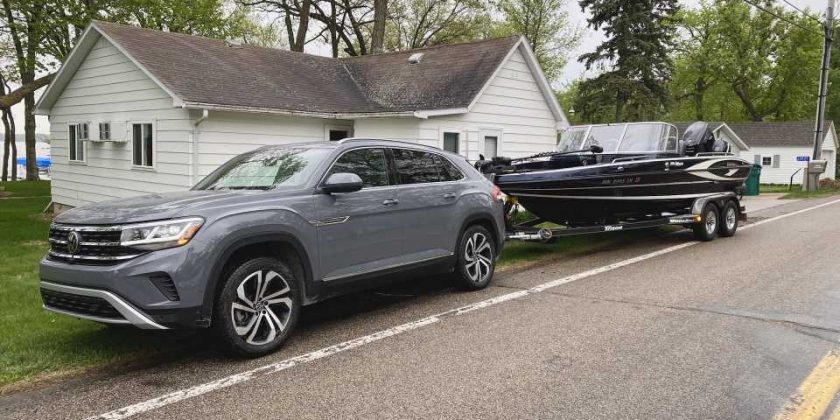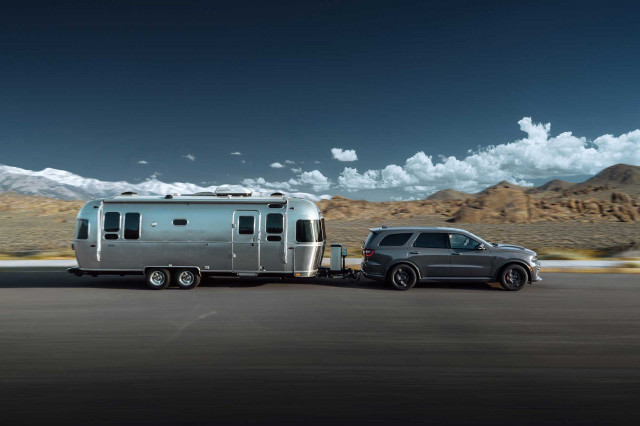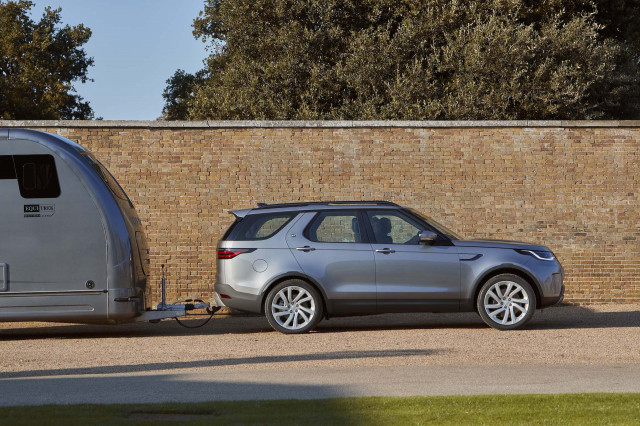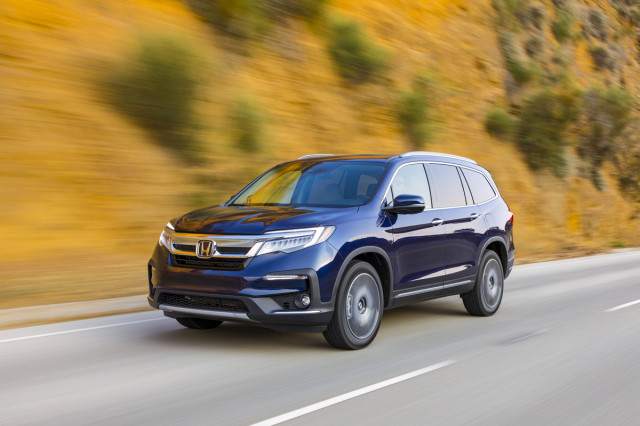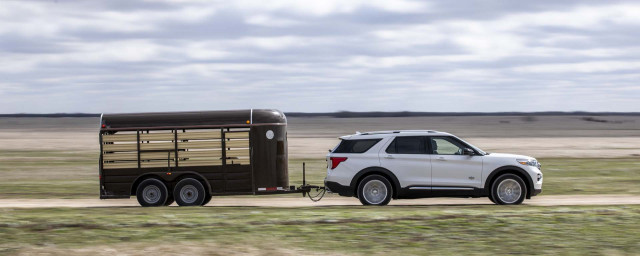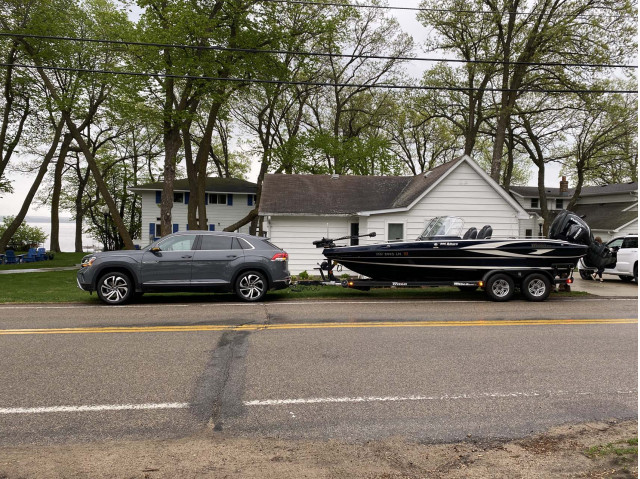Just because you can tow 5,000 pounds doesn’t mean you should.
Many popular three-row crossover SUVs such as the Kia Telluride and Volkswagen Atlas have maximum tow ratings set by their manufacturers of 5,000 pounds, but that doesn’t necessarily mean you should hook up 5,000 pounds of boat and trailer and drive away. It’s more complicated than that.
First, some housekeeping. The common towing terms should be understood before considering hooking up a trailer to a vehicle:
– GCWR stands for Gross Vehicle Weight rating, and it refers to the maximum loaded weight of a vehicle including passengers, pets, and gear.
– GCWR stands for Gross Combined Weight Rating, and it refers to the combined maximum weight of the vehicle, passengers, trailer, and whatever’s on said trailer including the gear and fuel.
– Tongue weight refers to the amount of weight directly applied to the vehicle via the tongue and hitch of the trailer, and should usually be between 10-15% of the gross trailer weight.
– The Society of Automotive Engineers (SAE) standard refers to J2807, which are the performance requirements for determining tow-vehicle gross combination weight rating and trailer weight ratings.
2021 Dodge Durango SRT Hellcat
Why does weight matter?
At what altitude will you be driving or how hot will it be? Higher altitudes, or going through mountain passes or over large hills, and extreme heat will put more stress on your powertrain. If too much weight is strapped behind a vehicle the brakes could overheat, the transmission could overheat, the cooling system might not be able to keep up, or worse, it could induce trailer sway and cause the vehicle to lose control and crash.
2021 Land Rover Discovery
Check that GCWR and your options
Every vehicle sold in the U.S. today has a label, usually in the jamb of the driver’s door, that lists the vehicle’s Gross Combined Weight Rating (GCWR). It’s not just the vehicle. Your boat and trailer might weigh a combined 4,500 lbs, but how much fuel is in the boat? How much does all the fishing gear weigh? That all adds up and needs to be factored into the equation. And don’t confuse this with tow rating.
Option a vehicle with bigger wheels, fancy options, that big panoramic sunroof, and ventilated front seats and you’re adding weight to the vehicle. This is weight that you’ll no longer be able to tow behind the vehicle as things add up towards the GCWR rating. Think twice before ordering those 22-inch wheels.
2021 Honda Pilot
Read the fine print
The 2021 Honda Pilot owner’s manual lays out that with two occupants weighing 150 lbs with 17.6 lbs of cargo per passenger, an all-wheel-drive Pilot equipped with the transmission cooler can tow 5,000 pounds with 500 lbs of tongue weight. Should there be four occupants in the Pilot weighing 150 lbs each with up to 17.6 lbs of cargo in the cargo area the towing capacity drops to 4,500 lbs and a maximum of 450 lbs of tongue weight. Extra cargo in the cargo area will reduce towing capacity further. Add enough passengers or cargo and the towing capacity of the Honda Pilot can suddenly drop from the advertised 5,000 lbs with 500 lbs of tongue weight to 2,500 lbs or less with up to only 125 lbs of tongue weight.
The best way to know how much the loaded vehicle and or trailer weighs is to take it to a truck weigh station.
2021 Ford Explorer King Ranch
How these ratings and capacities are calculated
Most automakers today use the Society of Automotive Engineers (SAE’s) J2807 standard when rating vehicles’ towing capacity. The qualifications are long, but the tests were created as a standardized set of recommended practices including rigorous real-world challenges. The end result determines the vehicle’s GCWR, which in turn is used to determine a maximum tow rating.
Testing includes, but is not limited to, going up and down a 12% grade under load at speeds including 45 mph, 55 mph, and 65 mph, acceleration runs from 0 to 30 mph and 0 to 60 mph along with passing tests of 40 mph to 60 mph. A lot of automakers use an 11.4-mile stretch of highway in Arizona known as the Davis Dam Grade to establish handling, braking, and cooling requirements.
2020 Volkswagen Atlas Cross Sport
Please, play it safe
A vehicle can safely tow what it’s rated to tow as long as the vehicle and load being hauled is at or under the GCWR rating, SAE representative Shawn Norwood told The Car Connection. But that doesn’t necessarily mean you should.
Pushing the limit may result in an experience that is less than desirable including trailer sway, noted Norwood. It can quickly become a game of “who’s in charge” whether the trailer’s leading the vehicle or the vehicle’s leading the trailer. That’s a game no one wants to play out on the open road.
A good reference point is to aim for the load to only be about 75-80% of the vehicle’s tow rating, Norwood said. That means, if you want to regularly tow a 5,000-pound boat and trailer then the aim should be for a vehicle with about a 7,000-lb tow rating.
It’s imperative to know how much you plan to tow on a regular basis, and in what conditions, before purchasing a vehicle. No one needs a heavy duty pickup truck to tow a 5,000-lb boat, but a Volkswagen Atlas Cross Sport might not be the best choice either. There are family haulers that can tow more than 5,000 pounds and still fit in the garage such as the Dodge Durango and Audi Q7.
Source: Read Full Article
